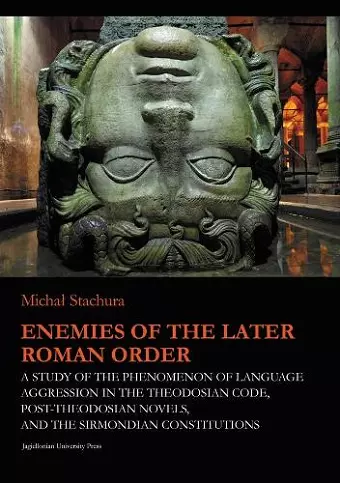Enemies of the Later Roman Order – A Study of the Phenomenon of Language Aggression in the Theodosian Code, Post–Theodosian Novels, and the S
Marcin Fijak author Micha Stachura author
Format:Paperback
Publisher:Uniwersytet Jagiellonski, Wydawnictwo
Published:7th Jun '19
Currently unavailable, and unfortunately no date known when it will be back

The book deals with the presence of language aggression in postclassical Roman law, in common opinion one of the characteristic features of the decadence at the dawn of the Byzantine culture. In his analysis of normative sources, the author makes use of an original research method whereby he concentrates on seeking out particular ideologically charged terms in the relevant articles of law, in order to analyze, throughout each selected corpus of legal documents, the context in which they appear and, on that basis, to determine their specific semantic fields. Notably, in his thorough analysis of the statements which are definitely negative in relation to those who are regarded as enemies of the state, he proceeds to examine such expressions semiologically, as based on the traditional forms of invective present in Greek and Roman literature.
The book consists of three parts: the first considers the methodological assumptions of the work, the second is devoted to an analysis of the negatively marked vocabulary as found in the relevant constitutions, and the third identifies the groups of enemies of the Roman order and presents conclusions resulting from the author’s analysis of the quantities of terms and expressions of invective in the relevant sources. The author attempts to determine semantic fields of the invective-forming expressions on the basis of a wide range of reference material, at times reaching as far as several centuries back (from the perspective of the Late Antique period). The book is intended for scholars and students of postclassical law, historians, and philologists.
In 1966, Ramsay MacMullen published an important book on "the enemies of the Roman order." It lists the social groups that had stood in actual opposition to the order reigning in the Roman Empire from the first up to the fifth century AD: senatorial opposition, philosophers, magicians, astrologers, rebellious inhabitants of cities, country brigands, even anachoretic hermits migrating outside the boundaries of the Roman community. At first glance, this varied assortment of figures appears to be collected at random. In fact, however, all these "characters" as assembled by MacMullen share one feature: their intense reluctance to conform to some aspect of the Roman order, which was constituted and defended by the Roman Empire.
This book states the question of the "enemies" in exactly the opposite way. The question it asks of the sources is: "Who did the rulers of the later Roman Empire, the guarantors of the Roman order, treat as enemies'?" It searches for answers to this question in the documents issued at the behest of the emperors themselves, products of the Imperial bureaux, and therefore - in particular - Imperial laws.The criterion on which it seeks and categorizes the "enemies" of the emperor-lawgiver is not the sanctions administered by said laws but the language in which these "enemies" are described. It considers the use of condemnatory language toward a given group - the language suitable for the phenomenon described, beginning from antiquity, as "invective." -- adapted from the introduction
ISBN: 9788323345053
Dimensions: 240mm x 169mm x 17mm
Weight: 514g
292 pages